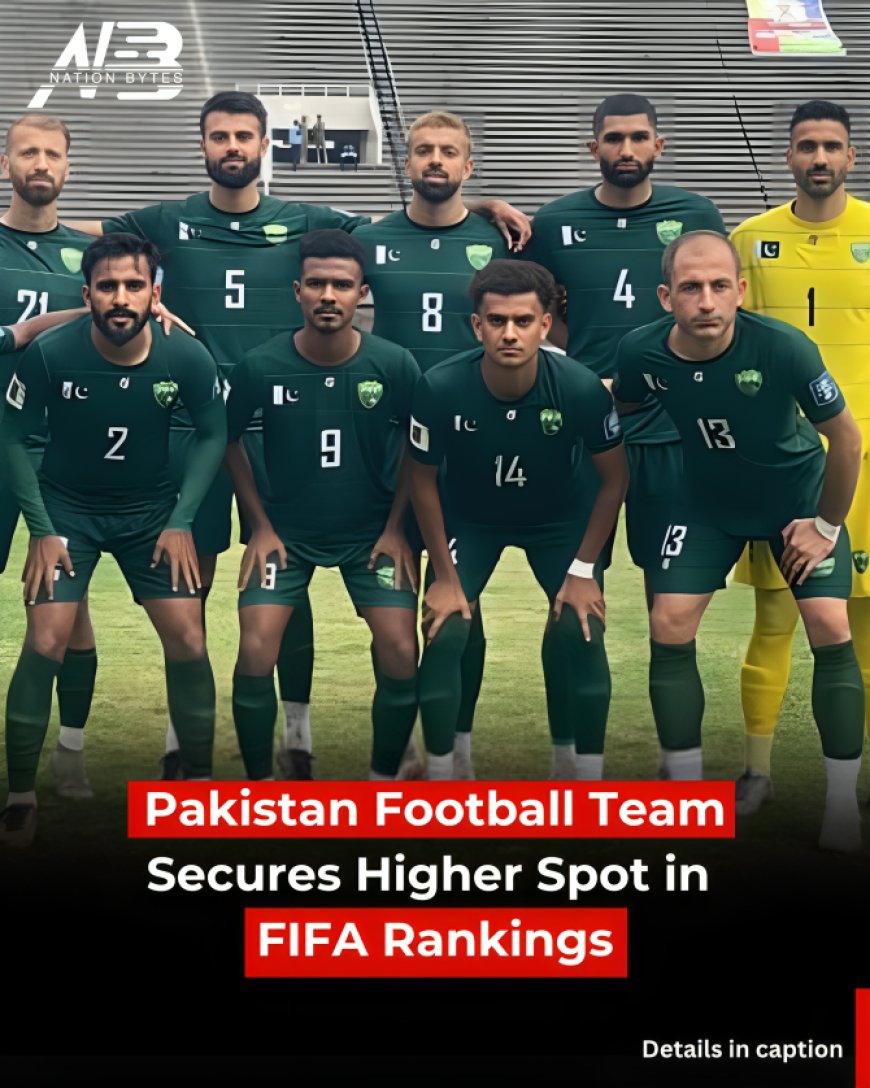Pakistan Football Team Secures Higher Spot in FIFA Rankings
Pakistan’s men’s national football team has moved up two places to rank 199th in the latest FIFA World Rankings, showing small but important progress.

The Pakistan men’s football team has seen a modest but meaningful rise in the latest FIFA World Rankings, climbing up two places to 199th. While the jump is small, it represents a bright spot for a nation that has long struggled in international football.
Although Pakistan still sits near the bottom of global rankings, moving up demonstrates a bit of momentum. These ranking updates do more than just change a number — they reflect improvements in performance, consistency, and promise on the field.
For the players, coaches, and fans, climbing the rankings is also symbolic. It shows that while Pakistan has much work to do, there is progress, however incremental.
Pakistan’s rise in the rankings comes after several international fixtures where the team showed signs of better discipline and competitiveness:
-
The recent cup and regional qualifiers and friendlies helped add ranking points.
-
Even when losses came, players showed more cohesion and fewer defensive collapses.
-
Opportunities like playing stronger teams, preparing under improved ranking pressure have helped the squad gain experience.
These performances didn’t always lead to wins, but close matches and competitive showings matter in FIFA’s ranking system.
To understand how far Pakistan has to go, a look back helps:
-
Pakistan’s highest-ever FIFA ranking was 141st in 1994.
-
Earlier in 2025, Pakistan had dropped to 201st, its worst-ever ranking
So moving from 201st to 199th may look small, but it’s a step in reversing a long downward trend.
Several factors appear to have contributed to Pakistan’s better ranking:
-
Improved coaching and preparation: The team has been working harder to rectify past mistakes, especially in defensive organization and fitness.
-
More international exposure: Even when wins are few, playing in more matches helps gain ranking points and develop match sharpness.
-
Reduced internal disruptions: Stability in the Pakistan Football Federation (PFF) and fewer administrative problems seem to have helped morale and focus.
-
Better player development: Emerging local talents are getting chances, and there is growing awareness of the need for modern training and tactical awareness.
Despite the upward move, Pakistan’s football team is far from where it wants to be. Here are some hurdles:
-
Few competitive fixtures: Match frequency is low compared to many other nations in Asia. Pakistan needs more regular friendly matches and qualifying games.
-
Shaky infrastructure: Training facilities, youth academies, and domestic leagues still lag. Without strong domestic foundations, it’s hard to sustain progress.
-
International breaks and funding gaps: Budget constraints, travel logistics, and sometimes political or governance problems impede planning for international games.
-
Need for consistency: Wins and close matches are helpful only if followed by continued improvement. Sporadic good performance won’t move the needle much.
The Pakistan Football Federation (PFF) has welcomed the ranking rise as a sign of encouragement. Officials said this boost should serve as motivation, not complacency. They stressed the need to build on this with better training, more matches, and youth development.
Fans, meanwhile, are cautiously optimistic. Social media has reacted positively, with many calling for more investment and support for national players. There is a sense among fans that this could be a turning point if momentum continues.
Pakistan has several opportunities ahead to keep improving:
-
Upcoming match vs. Afghanistan (October 9, 2025): The AFC Asian Cup qualifier is a chance to gain more ranking points and show further progress.
-
Focus on youth: Encouraging young players, holding more U-23, U-20 fixtures, and strengthening youth leagues.
-
Foreign exposure: Sending players abroad, arranging training camps, and inviting international coaches.
-
Structural reforms: More stable PFF governance, better domestic competition, investment in infrastructure.
Climbing from 201st to 199th in FIFA rankings may not seem dramatic, but for Pakistan football, it’s an important signal. It shows signs of recovery and growing discipline, offering hope for fans and players alike.
If Pakistan can build on this small win—improving infrastructure, increasing match frequency, and developing young talent—the team could gradually move closer to competing more strongly in Asia and maybe beyond.

 Israr Ahmed
Israr Ahmed